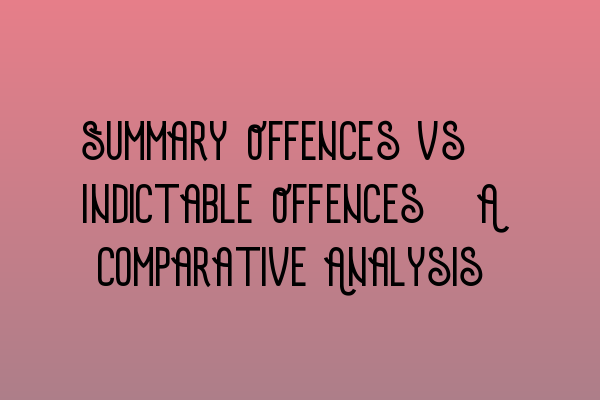Summary Offences vs. Indictable Offences: A Comparative Analysis
When it comes to criminal law in the UK, it is important to understand the distinction between summary offences and indictable offences. These two categories play a significant role in determining the course of legal proceedings and the potential consequences for individuals involved in criminal cases.
Summary Offences
Summary offences, also known as minor offences, are less serious criminal offenses that are typically tried in a Magistrates’ Court without a jury. These offenses are usually punishable by a maximum prison sentence of six months, a fine, or both. Examples of summary offences include minor theft, common assault, and public disorder offenses.
It is crucial to note that the complexity and seriousness of summary offenses can vary, and some may still have significant implications for the accused. Therefore, it is essential to seek legal advice and representation to navigate the legal process effectively.
If you are preparing for the SQE 1 exam and want to test your knowledge on criminal law practice, you can try our SQE 1 Practice Exam Questions to enhance your understanding of various criminal offenses, including summary offences.
Indictable Offences
Indictable offences are more serious criminal offenses that require a trial in the Crown Court. These offenses are typically tried by a judge and jury and can result in longer prison sentences and more severe consequences. Examples of indictable offenses include murder, rape, and major drug trafficking.
In contrast to summary offences, indictable offences involve complex legal procedures and often require the expertise of criminal law solicitors who specialize in defending clients in serious criminal cases. Proper legal representation is paramount in ensuring fair and just legal proceedings for the accused.
If you are preparing for the SQE 1 exam and want to assess your knowledge of criminal law theory and mock exams, you can try our SQE 1 Practice Mocks FLK1 FLK2 to enhance your understanding of indictable offences and the associated legal processes.
A Comparative Analysis
While summary offences and indictable offences differ in severity and the legal procedures involved, both categories aim at maintaining law and order in society and ensuring justice. The decision of whether a case falls under summary or indictable offense rests with the Crown Prosecution Service (CPS) based on the nature and seriousness of the alleged crime.
Understanding the differences between summary and indictable offences is crucial for aspiring legal professionals seeking to pass the SQE exams, particularly SQE 2. Our comprehensive SQE 2 Preparation Courses cover various aspects of criminal law to equip you with the necessary knowledge and skills to excel in your legal career.
For those preparing for the SQE 1 exam, our SQE 1 Preparation Courses can provide you with in-depth knowledge of criminal law and help you navigate the intricacies of summary and indictable offences.
It is also important to stay updated with the SRA SQE Exam Dates to plan your study schedule effectively and ensure timely preparation.
In conclusion, summary offences and indictable offences represent distinct categories within the criminal justice system, each with its own set of procedures and consequences. Whether you are studying for the SQE exams or seeking legal advice, understanding these differences is crucial in comprehending criminal law practice in the UK.
